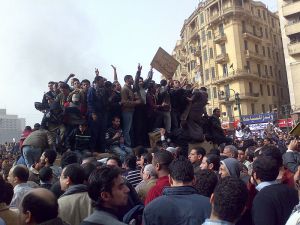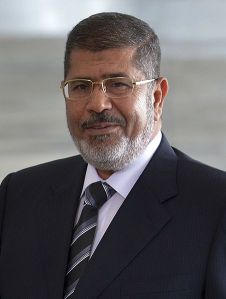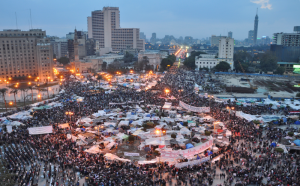 Being a South African watching the events unfolding in Egypt right now (the deposing of President Mohamed Morsi and the dissolving of Egypt’s Constitution in the last 24 hours), is much like being the neighbor of a particularly randy couple who have left their curtains slightly ajar when engaging in their private affairs. There is the voyeuristic excitement of watching a truly dramatic and (lets face it) entertaining spectacle unfold, without having to face any of the consequences of this dramatic denouement to the crisis in Egypt. And yet, as with the Peeping Tom, we here in South Africa ought to be left in the aftermath of our voyeurism with the discomfort of knowing that our own private fantasies of popular revolutions and overthrowing our democratically elected government (because we, like the Egyptians can relate to a President whose actions can be very unpopular) should remain nothing more than guilty fantasies. And whilst most social norms would call on the voyeur to avert his eyes from his neighbors’ business, we here in South Africa dare not avert our eyes from the events unfolding in Egypt, for the nature and values of democracy are once more at stake in the narrative unfolding on the streets of Cairo, and there will lessons learned in that country that need to inform us at the other end of the continent. It was as a response to calls by South Africans in favor of the Egyptian approach to what they perceived as SA’s own democratic failures that prompted me to write this post.
Being a South African watching the events unfolding in Egypt right now (the deposing of President Mohamed Morsi and the dissolving of Egypt’s Constitution in the last 24 hours), is much like being the neighbor of a particularly randy couple who have left their curtains slightly ajar when engaging in their private affairs. There is the voyeuristic excitement of watching a truly dramatic and (lets face it) entertaining spectacle unfold, without having to face any of the consequences of this dramatic denouement to the crisis in Egypt. And yet, as with the Peeping Tom, we here in South Africa ought to be left in the aftermath of our voyeurism with the discomfort of knowing that our own private fantasies of popular revolutions and overthrowing our democratically elected government (because we, like the Egyptians can relate to a President whose actions can be very unpopular) should remain nothing more than guilty fantasies. And whilst most social norms would call on the voyeur to avert his eyes from his neighbors’ business, we here in South Africa dare not avert our eyes from the events unfolding in Egypt, for the nature and values of democracy are once more at stake in the narrative unfolding on the streets of Cairo, and there will lessons learned in that country that need to inform us at the other end of the continent. It was as a response to calls by South Africans in favor of the Egyptian approach to what they perceived as SA’s own democratic failures that prompted me to write this post.
Right now, Egypt is once more celebrating and partying like there is no tomorrow at yet another powerfully visceral demonstration of ‘people power’ (a term I contest later). Egyptians (minus the Morsi supporters) feel upbeat about the future. However, it is in the aftermath of this crisis that the merit of military intervention and the unusual ousting of a democratically elected President that the events of the last 24 hours will be judged; just as with the party comes the hangover, so too will come the morning after for Egyptians. South Africans would do well to remember this.
To Coup or not to Coup, what is the definition?
With the overnight deposing of President Morsi by the Egyptian military, and the seemingly popular rejection by many Egyptians of his brand of conservative Muslim policy, international actors and states are stepping carefully in labeling these events a Coup d’Etat. Countries like the United States would be forced to suspend their $1.3billion in support to the Egyptian rebuilding efforts after Mubarak if recent events were defined in that manner. Yet, I am unable to come to any other conclusion than that the past 48 hours and conclusion represent exactly that – a Coup. Yes, others have pointed at the throngs of protestors in Tahrir Square as evidence that this is another popular revolution, or ask how is what has happened overnight different from the ousting of Hosni Mubarak? Yet there are distinct and significant differences between Mubarak’s fall and the ousting of Morsi, and for all the demonstrations of ‘people’s power’, Egypt’s democratically elected President did not bow to this pressure and step aside peacefully, or was voted out of power in an election, or removed by an act of Parliament, rather he was shoved aside at gunpoint by the Military, and unwillingly at that. Applying the Duck Test to our predicament “If it looks like a coup, and plays out like a coup, and accomplishes the ousting of a sitting President, then it must be a coup!”
Implications for Democracy
In listening to personal reactions by South African callers to talk shows this morning across various broadcasters, there was a seemingly recurrent narrative which expressed an idealistic admiration for the manner in which Egyptians are both so politically active and united against actions they find unpopular by their President. The thought process here seemed to be that if a President’s actions are not in line with the people’s desires, then the people have the right to replace the government, even if that requires military intervention a-la Morsi. It struck me that this expression reflects far more of a South African context painted onto the Egyptian situation rather than an actual understanding of what is going on in Egypt. I will reflect on these two issues separately.
Egypt one year on from elections
 President Morsi, elected almost exactly a year ago in a run-off against Ahmed Shafiq (who in the minds of many Egyptians represented a return to the old-school government of Hosni Mubarak, but polled well on a strong security platform ahead of the first round elections and surprised many by emerging as the second contender in the Presidential run-off), came to power on the strength of a seemingly powerful mandate.
President Morsi, elected almost exactly a year ago in a run-off against Ahmed Shafiq (who in the minds of many Egyptians represented a return to the old-school government of Hosni Mubarak, but polled well on a strong security platform ahead of the first round elections and surprised many by emerging as the second contender in the Presidential run-off), came to power on the strength of a seemingly powerful mandate.
His Muslim Brotherhood was the largest group in the newly minted Egyptian Parliament, and based on the evidence of electoral campaigns, his political platform was one of the best organised political formations in Egypt at the time. Shortly after his election however, Morsi clashed with both the Military and the Constitutional Court in separate incidents that hinted at the deep divisions which remained within Egypt’s complex post-Mubarak political and social landscape, as well as the prospect that some Mubarak era elements of state had remained intact through the course of the tumultuous revolution.
It became increasingly apparent that the results of the Presidential run-off were less an endorsement of the conservative Muslim politics represented by Morsi and more a rejection of even the symbolic return to ‘old Egypt’ which Shafiq seemed to represent. Over the course of his year in power, Morsi in fact achieved greater acclaim abroad for some of his international diplomacy efforts than he ever achieved domestically. Yet his determination to press ahead with a largely conservative, Islamic constitution and his failure to adhere to due process in tackling entrenched interests in the Courts appears to have acted as the rallying cry for the fractured and often disorganized opposition parties to coalesce against. After all, Tahrir Square has played host to many protests throughout Morsi’s year in charge, of varying and ultimately insignificant scale, until recent demonstrations seemed to once more gain the groundswell of support last seen during the final days of Mubarak.
Yet even with this groundswell, protests spreading to other areas of Egypt as well, Morsi remained defiant in the face of this opposition, secure in the knowledge that he has been democratically elected as President by the people in open elections. He was after all no strongman propped up by a repressive regime based on intimidation, draconian laws and the support of military and security elements. His success or failure in galvanizing an Egyptian economy still lurching along haltingly as Egypt strives to recover from the trauma of the Mubarak revolution, or his unwillingness to engage with opposition parties in a manner that reflected inclusiveness aside, Morsi was and (in principle anyway) still is Egypt’s democratically elected leader.
South African ‘envy’
To the second idea, that South African viewing on the Egyptian issue reflects more our own frustrated fantasies of the manifestation of people power than the actuality on the ground being seen in Egypt reflects. At the time of the Arab Spring, some analysts performed the intellectual equivalent of a contortionist’s bow to draw parallels between pre-Revolution Egypt and the existing political climate in SA, despite the similarities remaining thin at best. Yet what was interesting about initial responses to the deposing of an elected President in Egypt was the idea that people power might yet deliver up South Africa’s heretofore undefined version of the Holy Grail.
I want to try and unpack elements of this idea and examine them individually:
(1) Democratically elected leaders should not take unpopular decisions; they serve the people and should take their cue from those they were elected to serve. Simply enunciating this statement should demonstrate how absurd and unworkable this notion is in any democracy. Modern democracies allow the formation of Government and stipulate terms of office for many reasons, but one of these is that the citizen delegates authority of decisions of state because he/she does not have the inclination or opportunity to exercise the responsibilities of state directly. One of the least popular acts of any government is the levying of taxes from its citizens, and it is this interaction between the tax payer acquiescing to render to Caesar what is Caeser’s, and Caeser building roads and sanitation that defines the notion of the citizen in the first place. If Democratically elected leaders can be replaced by popular protest, a country is on a slippery slope which may ultimately lead to anarchy and an inability to govern.
 (2) Military intervention, when supported by popular sentiment, is justifiable. Even during the time of Aristotle, the Greek philosopher was concerned about a major flaw of democracy he called the ‘tyranny of the majority’. His concern was that even when democratic processes are followed, there remains the risk to the minority that they will have the values of the majority ‘tyrannically’ imposed on them. The consequence of this thinking has lead to various systems which seek to devolve levels of authority federally within states or create checks and balances against the absolute power of the majority. The problem with the deposition of Morsi as Egypt’s President being described as a popular move with the majority of Egyptians is that we are not able to quantify this statement. The only measurement available to assess the extent of President Morsi’s support in Egypt is a national vote on his popularity. The problem with the legitimacy of this uprising is that Egyptians were given the opportunity to pronounce on Morsi as a candidate for leadership only 12 months ago. Morsi has been legitimately declared the most popular single candidate to act as President, in an election in which 50% of the eligible voters opted not to cast a vote for any candidate at all in the Presidential elections in 2012. Thus, even if one accepted that popular support for unconstitutional actions by the military justifies their actions, the military has no legitimate basis for claiming they represent the majority of Egyptians (supporters of Morsi’s ousting might point to the Tamarrud claims to have received 22 million+ signatures on their petition calling for Morsi to step down – even if true, the use of such documents to replace democratically elected Presidents is fraught with dangers).
(2) Military intervention, when supported by popular sentiment, is justifiable. Even during the time of Aristotle, the Greek philosopher was concerned about a major flaw of democracy he called the ‘tyranny of the majority’. His concern was that even when democratic processes are followed, there remains the risk to the minority that they will have the values of the majority ‘tyrannically’ imposed on them. The consequence of this thinking has lead to various systems which seek to devolve levels of authority federally within states or create checks and balances against the absolute power of the majority. The problem with the deposition of Morsi as Egypt’s President being described as a popular move with the majority of Egyptians is that we are not able to quantify this statement. The only measurement available to assess the extent of President Morsi’s support in Egypt is a national vote on his popularity. The problem with the legitimacy of this uprising is that Egyptians were given the opportunity to pronounce on Morsi as a candidate for leadership only 12 months ago. Morsi has been legitimately declared the most popular single candidate to act as President, in an election in which 50% of the eligible voters opted not to cast a vote for any candidate at all in the Presidential elections in 2012. Thus, even if one accepted that popular support for unconstitutional actions by the military justifies their actions, the military has no legitimate basis for claiming they represent the majority of Egyptians (supporters of Morsi’s ousting might point to the Tamarrud claims to have received 22 million+ signatures on their petition calling for Morsi to step down – even if true, the use of such documents to replace democratically elected Presidents is fraught with dangers).
Consider a South African parallel. During his pomp, Julius Malema, the firebrand ANC Youth League President, seemed to have mass support amongst the youth and unemployed masses of South Africa. Had Malema and his supporters staged mass protests calling for the dissolution of the Constitution, and the SA National Defence Force (SANDF) had responded by rounding up the South African President, Cabinet and dissolved the Constitution based on this apparent ‘popular protest’, how much legitimacy should the SANDF’s actions have been given? As time has shown, Malema’s genuine supporters proved far fewer than his rallies and events suggested. In time, this may yet prove to be the case in Egypt as well.
Where to for Egypt now?
In many ways, Egypt today is in a far more precarious position than at any time since the start of its popular uprising. It is once again under military rule, the same military which holds a massive economic stake in Egypt’s economy, and it is once again without a Constitution. Egyptians have demonstrated their ability to unite around what they find unacceptable, but continue to struggle to unite around the direction they want their country’s democracy, economy and social fabric to take. On this point, South Africans can probably identify. Yet for Egyptians to have not only allowed military intervention in replacing a democratically elected leader but to have cheered it on while doing so sets an exceptionally dangerous precedent that South Africans and supporters of democracy globally should all avoid at all costs.
The outcome of Egypt’s ousting of President Morsi is yet to be written, but by all accounts Egyptians still have some very serious questions that need to be resolved, not least among these whether or not the country is ready to accept democracy’s flaw’s along with its triumphs. In all likelihood, the military will be placed under severe pressure once more to rush to elections to form a new government, but unless the electoral process and the subsequent development of a ‘new’ Constitution are developed to foster consensus, the revolution may yet devour another President in a year or two. At which point, I wonder whether the voyeurs in South Africa and elsewhere will still be watching?
[Edit] Subsequent to this post, the AU has released a statement on their initial response to the crisis in Egypt. Click here to read the statement.

Nice article.
In my (limited) understanding, the Egyptian people were growing more and more frustrated with the direction that the government of Morsi was taking the country. Yes he won the election, but that seemed to be the result of the poor campaigns of his opponents, rather than the popularity of his plans. Given the discontent, do you think there would have been a Parliamentary intervention in Egypt? Would Morsi have called for a referendum? He was unwilling to go, yes, but was he willing to change his goals if he polled the population and found minority support for his plans? People who did not vote in the elections because the could not stomach a return to the ‘old era’, might have voted in a majority in opposition to Morsi’s plans, no? Would this not have undermined his government? Was Morsi scared of this? Did he precipitate military action? I ask because the issue of a government that pursues it’s own agenda, ignores criticism (no matter how valid the basis for it appears to be), and doesn’t call for a referendum on contentious issues is familiar to South Africans, particularly over the last decade.